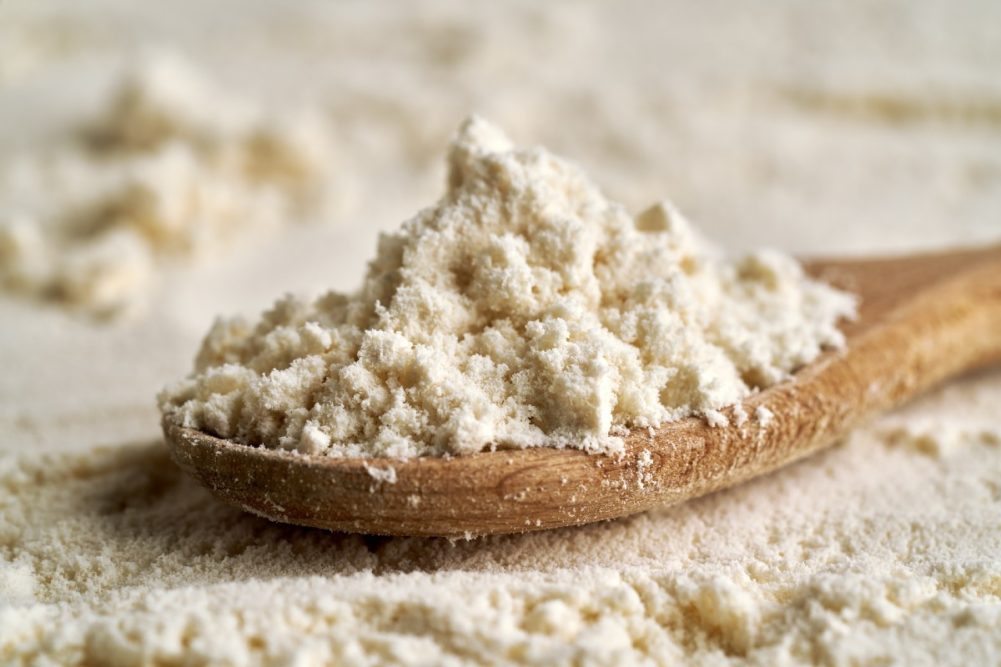LAS VEGAS — Precision fermentation plays a vital role in the animal-free dairy category. Speakers at SupplySide West in Las Vegas talked about the technology’s sustainability benefits, potential food safety issues and cost-reduction options.
Replacing one truckload of conventional whey protein isolate with Perfect Day’s animal-free whey protein isolate could save 1,276 tonnes of carbon dioxide emissions and 92.3 million liters of water used, said Ty Wagoner, PhD, scientist for the Berkeley, Calif.-based company.
John Fagan, PhD, chairman and chief scientist for the Health Research Institute (HRI), said 92 unknown compounds in what he called “synbio milk” needed to be studied for food safety reasons, including by the US Food and Drug Administration (FDA).
Exploring alternative substrates for use in precision fermentation in general, and not just in the dairy category, could bring down the costs, said Monica Bhatia, PhD, co-founder and co-chief executive officer of Equii, San Francisco.
Reaching commercial scale
Perfect Day in April 2020 received a “no questions” letter from the FDA about the Generally Recognized As Safe (GRAS) status of its beta-lactoglobulin, a proprietary protein for its products. The company uses precision fermentation to create proteins found in nature but made without animals, which decreases land use, water use and carbon dioxide emissions, Wagoner said.
Precision fermentation involves providing a microorganism with a genetic code to produce a protein of interest.
“Obviously, genetic engineering is a key part of that process,” he said.
Genetically modified organisms are the organisms that produce the protein.
“The end product is not a GMO,” Wagoner said.
Perfect Day is producing its ingredients at commercial scale. Products containing the ingredients are in more than 5,000 stores, he said.
Precision fermentation makes it more efficient to produce lactoferrin, a whey protein that makes up 0.3% of the total protein in cow’s milk, Wagoner said.
“We just make that protein (lactoferrin),” he said. “You don’t worry about removing everything else from the milk. You just make lactoferrin.”
Perfect Day’s animal-free dairy protein is a dairy protein. Consumers allergic to conventional dairy protein still will be allergic to Perfect Day’s dairy protein, Wagoner said.
92 unknown compounds
Fagan said “synbio milk” involves genetically engineered whey genes and yeast/fungal compounds. Precision fermentation creates the milk. HRI, Fairfield, Iowa, found 92 unknown compounds in such milk through HRI’s full spectrum molecular analysis, which detects and quantifies every molecular species in samples.
“We say we make the invisible visible,” Fagan said.
None of the 92 novel yeast/fungal compounds are GRAS or have undergone any FDA testing, he said.
“Basically there are 92 compounds identified in synbio milk that are not named by scientists,” he said. “Nobody has looked at them for safety, nutrition, quality.”
He said the synbio milk products should have a risk warning on packaging or be taken off the market.
Consider protein yields
Sweeteners, because of costs, often are used as substrates in the precision fermentation process, Bhatia said. Corn syrups costs about 50¢ per kg, and sucrose costs 50¢ to 80¢ per kg, she said.
A substrate’s protein yield, which means protein recovered per kg of fermentation, will affect costs. A yield of 2% for a substrate could lead to $25 to $40 per kg added to a product’s total costs, Bhatia said. A yield of 5% could drop the added cost to $10 to $16 per kg, and a yield of 10% could drop the added cost to $5 to $8 per kg.
Potential substrate sources that possibly could offer higher yields include wheat, rice, millet, sorghum, peas, chickpeas, corn, cassava and bananas, Bhatia said. Upcycled substrates might be dried distillers’ grains, fruit pulp and whey.
Equii, a food technology startup, has a proprietary approach to discover microbial proteins that are used to ferment grains and produce high-protein grain flours.

